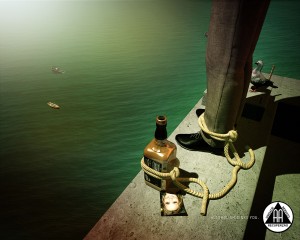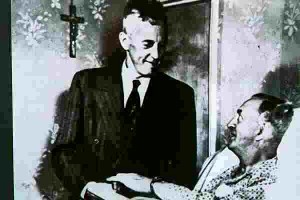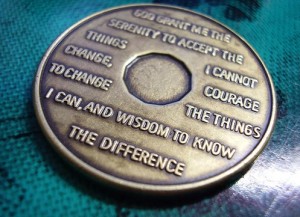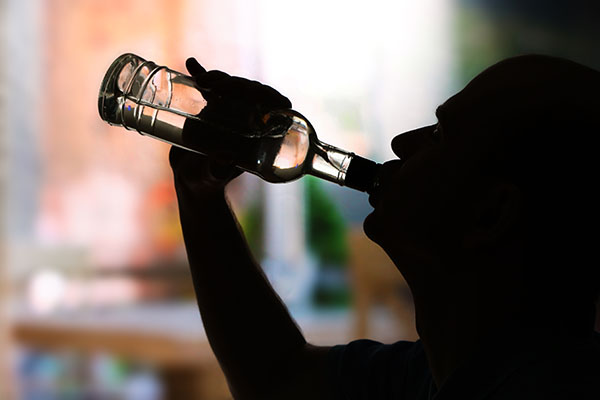The fault line of the false choice between religious belief and secular belief is being drawn down the middle of Alcoholics Anonymous. Disdaining the religious tone and ‘Higher Power” appeals of AA meetings, new chapters are springing up, catering to “atheists, agnostics, humanists and free thinkers.”
 “A.A. starts at its core with honesty,” said Dorothy, 39, who heads up the steering committee for a convention of atheists and agnostics. “And how can you be honest in recovery if you’re not honest in your own beliefs? If you don’t believe in the God they’re praying to, that’s not honest practice.”
“A.A. starts at its core with honesty,” said Dorothy, 39, who heads up the steering committee for a convention of atheists and agnostics. “And how can you be honest in recovery if you’re not honest in your own beliefs? If you don’t believe in the God they’re praying to, that’s not honest practice.”
Alcoholics subconsciously deny the truism that ‘no man or woman is an island.’ Indeed, the opposite attitude—‘I am an island’—lies at the root of alcoholism, and rediscovering commonality through shared pain can be an integral part of the cure.
Putting all one’s faith in a “fellowship of concerned, loving people” however, as “We Agnostics and Freethinkers International” are doing, is even greater folly than putting faith in a Father God. It’s also doubly ironic, since an underlying reason so many people have taken to the bottle and lost faith in a power beyond the human mind is because they’ve lost faith in people and humankind.
Most people usually see substance abuse in completely individual terms. To a point, that’s necessary. Taking total responsibility for oneself without any excuses about the family and society one came from is certainly the hallmark of AA’s success in helping alcoholics help themselves and each other to stop drinking. That’s a lesson all of would do well to learn.
But AA also reflects larger trends in society. Atheism and secularism are on the rise, and many describe a discomfort with the AA process due to ‘the religious tone that has become the norm within AA.’ But they’re throwing the baby out with the bathwater.
As Albert Einstein said, “If one purges the Judaism of the Prophets and Christianity as Jesus taught it of all  subsequent additions, especially those of the priests, one is left with a teaching which is capable of curing all the social ills of humanity.” That goes for all authentic religious teachers, whatever the tradition—without subscribing to the ‘all religions are the same at the core’ notion.
subsequent additions, especially those of the priests, one is left with a teaching which is capable of curing all the social ills of humanity.” That goes for all authentic religious teachers, whatever the tradition—without subscribing to the ‘all religions are the same at the core’ notion.
Surrendering control, and embracing the realization that there is something greater than oneself and the human mind, is a core component of recovery. That’s a very different from the ‘fake it until you make it’ mentality recommended to many AA attendees.
The name one gives a ‘Higher Power,’ if one gives it a name at all, doesn’t matter. Of course, reciting the Lord’s Prayer at the end of AA meetings, as is the custom, is a different kettle of fish.
This is a culture that lends itself to subtle or blatant forms of nihilism. A culture that drives people to self-medicate through alcohol or cannabis, not to mention the more direct palliatives of cocaine and heron. More respectable methods involve anti-anxiety drugs and anti-depressants that psychiatry and advertising are pushing.
Questioning prevailing ideas, such as the DNA-causation of depression, which avoids confronting the cultural triggers of such genetic predispositions, including alcoholism, is essential. But nihilism implies the belief that nothing is worthwhile, a condition feeding the homicidal ennui of the young mass murderers that American culture is producing. Psychotropic drugs have their place, but they’ve become a substitute for addressing the predominant factor of the cultural environment, which is taken as a given.
 An overemphasis on reason and rationalism can produce shriveled hearts as much as decaying religious belief. Reason and fellowship are necessary for human wellbeing, but not sufficient to nurture it. The question before thinking and feeling people today is: Do human beings require religion in any sense of the word?
An overemphasis on reason and rationalism can produce shriveled hearts as much as decaying religious belief. Reason and fellowship are necessary for human wellbeing, but not sufficient to nurture it. The question before thinking and feeling people today is: Do human beings require religion in any sense of the word?
The issue is not, to my mind, religious belief or unbelief, but religion in the deepest sense. Religion in the true sense has nothing to do with creeds, rituals, churches and beliefs. The essence of religion is the awakening of insight and love in the human heart.
Religion is not the outward things of the mind, such as creeds and scriptures, however inspired they may originally have been. It is the inner quality, the feeling of the earth and human being beyond words, concepts and reason. It grows out of the silence of being, without which human consciousness becomes a desert, and people become the walking dead.
Holiness is not the priest’s idea of virtue, or a corrupt church’s decree of sainthood. The worst ‘sinner’ can experience holiness when he faces his mistakes, however grievous, and is cleansed by opening himself to the infinite waters of life.
The essence of love emanates from beyond the human mind. We don’t feel it because our hearts are occluded, eclipsed by the dark shadows made by the separative mind. Believing, in a dead culture such as this, that there is nothing other than the human mind, feeds the emptiness within.
To negate everything one thinks and believes, and stand completely naked before the universe, is not to be nihilistically reduced to nothing, but to be filled with universal being. Negation isn’t nothingness, and nothingness isn’t nihilism.
That’s the essence of religiosity, and we cannot heal and grow without it.
Martin LeFevre

